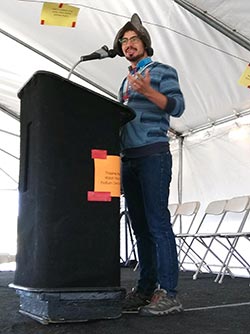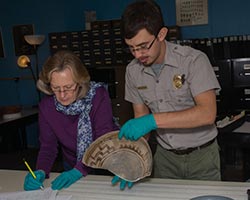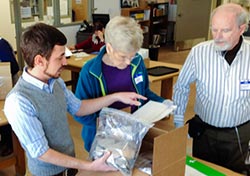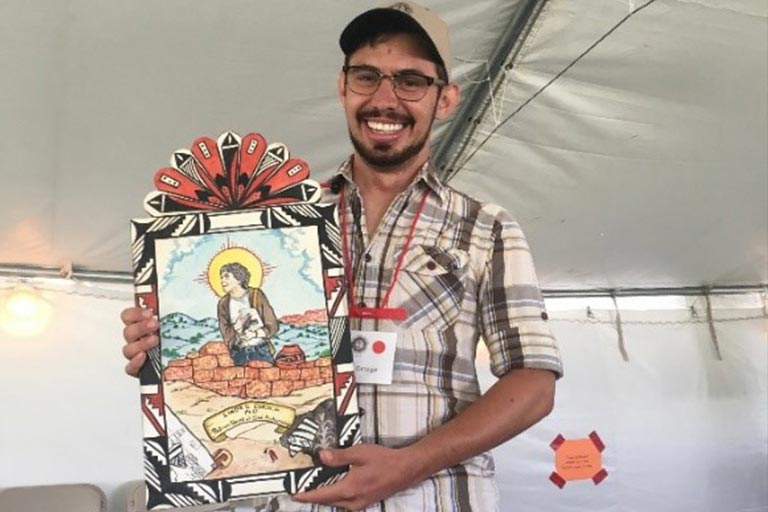Ethan Ortega, who graduated from Eastern New Mexico University in 2013, won first prize for the Cordell-Powers competition at the 2017 Pecos Conference in August for his research at Coronado Historic Site.
The Pecos Conference is an annual conference of archaeologists held in the southwestern United States or northern Mexico. The Cordell-Powers Prize is an award for the best extemporaneous talk presented at the Pecos Conference each year by an archaeologist, 35 years of age or younger.
"I first learned about the Pecos Conference in a Southwest Archaeology class at ENMU," explained Ethan, who graduated with a bachelor's degree in anthropology and a minor in geology. "Our professors encouraged us to go my senior year, which ended up being a fantastic experience, and I have gone almost every year since."
Ethan was selected to participate in the Cordell-Powers competition for the past three years, but "never placed above third until this year. This encouraged me to conduct more research and attempt inclusive and innovative projects in archaeology, which paid off this year by winning first place."
Ethan, who donated the $550 cash prize he received for winning the Cordell-Powers competition to the Coronado Historic Site, thinks that the Cordell-Powers Prize is "fantastic," because it "not only pushes young archaeologists to hone their speaking skills, but it also inspires unique and diverse work in the field."
The ENMU graduate, who is currently working on a master's degree in museum studies at the University of New Mexico, gave a presentation for the competition titled "False Truths, Restored Ruins, and New Artifacts: Looking Beyond the Oxymoronic Past of Coronado Historic Site through Field Work."
The presentation focused the work of 75 volunteers over seven weeks excavating dozens of test units at the Coronado Historic Site, showing that Kuaua Pueblo was larger than once thought and may have had an extensive turkey industry.
Ethan knew he needed something to grab the audience's attention during his presentation, so he wore a replica Coronado Helmet to talk about the history of the Coronado Historic Site.
His favorite part about the conference was having "informal talks around campfires, where you really get to know other archaeologists and learn about the groundbreaking projects that they are working on."
Ethan's interest in anthropology began at age 10 when his parents arranged for him to participate in a paleontological dig in Texas.
"From there on out, I knew that I would spend my life digging in the dirt," said Ethan, who was raised in Portales. "Over the next few years, my interest shifted from dinosaurs to human history. That is why I chose anthropology, but I still think dinosaurs are pretty cool."
He chose to attend ENMU because he knew it had a "fantastic anthropology program and I knew that, as a student, I would have the opportunity to work at the world renowned Blackwater Draw site."
His parents, Melody and Orlando Ortega, and sister, Andrea Ortega-Conlan, are ENMU graduates.
The former Mu Alpha Nu Anthropology Club member said Eastern was a "great learning environment with small classes and one-on-one opportunities with faculty. "
Ethan worked at the Blackwater Draw National Historic Landmark, the Runnels Gallery, and the Department of History, Social Sciences and Religion. He also worked in archaeological field schools in Spain to get credit toward his degree.
"ENMU was a fantastic place to earn my undergraduate degree. I met some of my best friends while I was there, and many of those people are still in my life."
Ethan said that Eastern prepared him for his career by providing "unique hands-on learning opportunities and networking with professionals in the field of anthropology and archaeology."
He currently works as a historic site ranger for the Northern Region of New Mexico Historic Sites, which is part of the Museum of New Mexico system and includes Coronado Historic site and Jemez Historic Site.
His job duties include curating exhibits, coordinating research, archaeology and preservation. He also gives public talks and tours regularly and coordinates about 40 volunteer researchers.
The historic site ranger's career goal is to become a full-time curator of an anthropology or archaeology museum.
"For any position that I find myself in, I want to continue to break down the barriers between the public and archaeology to get people interested and taking an active part in decoding their history."
In addition to winning first prize in the Cordell-Powers completion, Ethan recently received the "Edgar Lee Hewett Award for Service to the Public" from the New Mexico Historical Society and the "Bice Award for Archaeological Achievement" from the Archaeological Society of New Mexico.
"As far as we can tell, I was the youngest to have received these awards," said the UNM graduate student, who earned a graduate assistantship, fellowship and underrepresented group scholarship.
During his time at ENMU, he was selected to speak at the honors graduation banquet representing the College of Liberal Arts and Sciences, inducted into the Phi Kappa Phi National Honors Society, awarded the "Peggy Tozer Endowment in Anthropology," received first place in the "Archaeology Paper Category" and first place in the "Environmental Sciences Poster Category" at ENMU's Student Research Conference in 2013.
He was also named the "Outstanding Undergraduate in Anthropology" for 2011-12 and received several scholarships, including the "New Mexico EPSCoR Seed Award in Climate Studies Scholarship," the "Anthropology Faculty Scholarship" and "Noel Lanci Memorial Scholarship in Field Work."
Ethan's hobbies include hiking, camping and exploring the Southwest. He is also a "maker," so he "spends a lot of time building and creating things."
His role models include his boss Matthew Barbour, northern region manager of New Mexico Historic Sites, Marc Thompson, former director of the El Paso Museum of Anthropology, my fiancé Justin Garoutte, director of Conejos Clean Water, and Brian and Carolyn Gilmore, members of the Board of Directors of the Friends of Coronado Historic Site – the largest museum support group in the state.
"My role models are great encouragers and always push me to set new goals or achieve established ones," said Ethan. "I am also influenced by the many great archaeologists from New Mexico's past who were known for doing innovative projects, like Cynthia Irwin-Williams, a former professor at ENMU."
Ethan's advice for students interested in anthropology is to "get out in the field. Many people interested in archaeology go from one degree to the next. Experience is key to getting and keeping jobs in archaeology or museums.
"Don't be afraid to call historic sites and ask for intern or volunteer positions, these opportunities are out there, you just need to seek them out," he explained. "Also, share archaeology with the public. Research does no good if it gets published in a manuscript and sits on a shelf for 100 years. Get your research out there, remember – this is the public's history, too."







